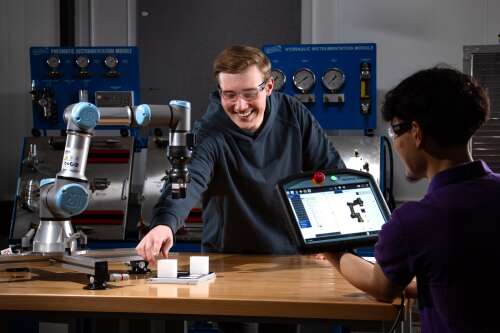Two students are working on a robotic arm as part of MCC's Career and Technical Education (CTE) program. Recognizing the program's effectiveness in providing hands-on training and preparing the workforce for high-demand jobs, MCC joined community colleges across the state to celebrate CTE Month.
Provided by McHenry County College
McHenry County College joins community colleges across the state in celebrating Career and Technical Education Month this February. CTE programs provide students with hands-on training and real-world experience in a variety of industries, playing a valuable role in preparing the workforce for high-demand jobs.
“The CTE program ensures that the workforce needs of our local economy are met,” said Dr. Arlene Santos George, MCC Vice President of Academic Affairs and Workforce Development. “These programs will continue to be effective by preparing students with the skills and competencies needed for a variety of high-demand, high-wage, or highly skilled career fields.”
According to the National Skills Coalition, nearly two-thirds of jobs in the U.S. economy require some education beyond high school, but not necessarily a four-year college degree. Many of these jobs are in CTE fields such as healthcare, advanced manufacturing, and IT, which are among the fastest-growing occupations projected to grow by 2029, according to the U.S. Bureau of Labor Statistics.
“Illinois Community Colleges are one of the state's leading workforce developers and continue to expand access and opportunity to numerous high-paying careers,” said Brian Durham, executive director of the Illinois Community College Board. ” “Community college CTE programs are an important part of the state's workforce development strategy, and we are proud to help prepare the next generation of workers.”
MCC is further strengthening its commitment to high-quality CTE products with the opening of the Foglia Advanced Technology Innovation Center this fall. Foglia CATI offers programs in Architectural and Engineering Design Technology. Automation, robotics and mechatronics. construction management; engineering technology; air conditioning equipment; precision machining; and welding and fabrication.
“We are excited about the expanded training opportunities that the Foglia CATI Building will bring to our community,” said Tom McGee, director of manufacturing and advanced technology at MCC. “We worked with many local employers to understand what they were looking for in their workforce and incorporated that feedback into our curriculum. They receive hands-on training from experts and gain experience using state-of-the-art, industry-standard equipment. They excel in a variety of roles and are skilled workers in our community's largest employment sectors, including manufacturing and technology. They will graduate prepared to meet the needs of their people.”
In addition to Foria CATI's programs, MCC recently added and redesigned several CTE programs to ensure students receive cutting-edge training and a seamless educational experience. The university has enhanced programs in accounting, office technology, baking and culinary arts, horticulture, network security, and software application design and development.
CTE programs at Illinois community colleges offer a cost-effective way for individuals to pursue their career goals at a fraction of the cost of four-year college tuition, making them a more accessible option for many students. It becomes.
Statewide, nearly 37,500 students graduated from the more than 4,600 approved CTE certificate and degree programs offered by Illinois community colleges in 2023.
For more information about CTE programs offered at MCC, visit www.mchenry.edu/programs.


